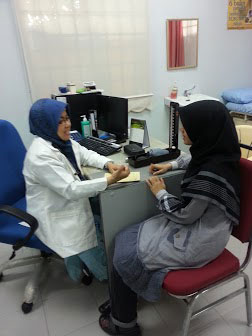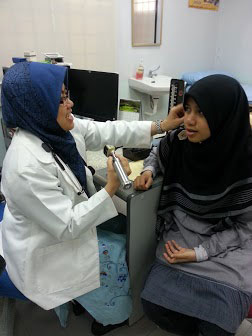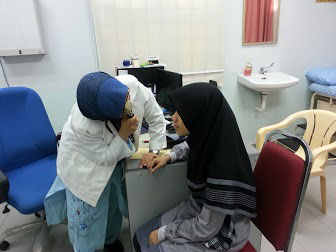Introduction
There are times for us all when we feel really ill, miserable or confused and we cannot cope anymore. One of the aims of this article is to help you to care for yourself and decide when and if you need to see a doctor or any healthcare staffs.
As a teenager you need to know your health status or how well you are even though you’re healthy. Every health clinic has a screening programme specifically for teenager like you.
It may seem a little scary to go to a clinic, but doctors, nurses, and other clinic staffs are there to help people who are sick or hurt to feel better. Read on to find out what happens inside a clinic. To make you more comfortable, you can ask your mum or dad to come into the doctor’s room with you.

Consultation between the doctor and a teenager is always confidential.
Why do you need to go to the clinic?
It is a chance for the healthcare staff or doctor to monitor your growth and development. The important aspect of going for health checkup is for you to have a chance to ask any questions about your health. You might wonder when you will grow taller or whether your weight is appropriate.
What you need to prepare before going to see a doctor?
You must learn to give appropriate information on your condition so that the doctor can recognize what illness or condition you are suffering and offer the best treatment.
Your visit to the clinic will be much more satisfying if you state exactly what is troubling you, clearly and directly. It really helps if you make a note of any points, date, time and symptoms that are relevant. If for example, you are suffering from fever, cough and sore throat, it is useful to be able to state quite clearly:
- When you first become aware of it.
- What are the nature of the fever, cough and the colour of the sputum
- The things that make it better and make it worse.
If the questioning leads the doctor to a working diagnosis, he will ask you about other elements in your life such as appetite and sleep and examine you to try to rule out the possible serious cause of fever.
You should also prepare to ask your doctor for a clear explanation of your condition and what treatment is the best for you.
What to expect at the clinic?
When the nurse calls you, she might start checking your temperature, weight, height and blood pressure and may take your blood for haemoglobin level (if you’re a girl attending the adolescent clinic). A haemoglobin level test is a blood test that provides information on how effective your red blood cells carry oxygen to your body.
You may be instructed to undergo other blood tests or x-rays when necessary to confirm how well you are.
They might ask you to fill in the screening form for adolescent before seeing the doctor.
The doctor will greet you and ask you some questions and would like to know your concern. He will listen to your heart and lung, look inside your eyes, throat, ears and nose. He or she will probably check your abdomen, breast, private part/genital and examine your spine.
The following are the reason why the doctor or healthcare staffs is doing the examinations:
The blood pressure:
- This shows how hard your heart is pumping the blood throughout your body.
- Blood pressure can be too low or too high.
Body temperature:
- Using a thermometer, the doctor can find out whether you are having fever (more than 37 degree Celcius) or normal range (between 36.1 to 37.0 degrees Celcius)
Listening with stethoscope:
- To listen to your heartbeat and your lung sound and to make sure that your heart and lungs are healthy.
Looking in your ears, nose, and throat:
- The doctor is able to tell whether you have infection in your throat or nose by examining you. The doctor is using the otoscope to look at your ears to spot any ear problems, like fluid in your ear or ear canal infection.

Ear examination using otoscope
Looking in your eyes:
- The ophthalmoscope lets the doctor see the retina, the nerve that sends messages to the brain. Though the doctor is shining a light in your eye, try to keep your eye still so the doctor can get a good look of your retina.

Eye examination using opthalmoscope
Checking reflexes of your knees and elbows with a tendon hammer:
- This is when the doctor taps your knee and your leg swings up without you doing anything. This tests how well your nerves are carrying messages in your body. When your reflexes respond to the hammer, the doctor knows your nerves works well and able to carry messages from the brain and spinal cord that tell your body what to do.
Examine your abdomen:
- The doctor can examine your stomach, intestines, liver, spleen and kidneys to make sure yours fells just right.
Breast and genital examinations:
- This one might make you feel a little uncomfortable, so it can help if your mom or dad is with you during the exam.
- The doctor or a nurse will do a breast examination to make sure that your development are normal and to detect lumps, cysts or other breast problems. The doctor or nurse may also teach you to do breast self-examination to help you become familiar and know which lumps are normal and which may need further referral to the doctor.
- The doctor may examine your private parts. He or she will examine the vagina if you’re a girl, and the penis and testicles if you are a boy. Changes in these areas, such as growing hair, are signs that show you’re progressing toward puberty and developed normally.
Examination of your spine:
- The spine should be straight. But sometimes, a teenager’s spine has a curve and some curves are called scoliosis. Small curves usually cause no problems, but for larger curves you may need to get an X-ray or see an orthopedic doctor who specializes in the treatment of the scoliosis.
Do you need a shot?
Shots are medicine that the doctor puts right into your body with very tiny needle. Shots help you to stay healthy by keeping you from getting sick. (HPV Immunization)
Question and Answer Time:
The doctor will leave time at the end of checkup for questions. You are encourage to ask any and all questions you have which is bothering you. No matter how stupid or embarrassing you may feel, the doctor will try her best to answer your questions. All the information given by you will be kept confidential. By asking questions you will learn more about taking care of yourself and you will learn more about the way your body works.
| Last Reviewed | : | 20 December 2012 |
| Content Writer | : | Dr. Wan Fadhilah bt. Wan Ismail |







